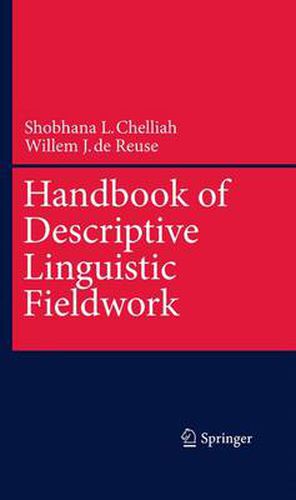Readings Newsletter
Become a Readings Member to make your shopping experience even easier.
Sign in or sign up for free!
You’re not far away from qualifying for FREE standard shipping within Australia
You’ve qualified for FREE standard shipping within Australia
The cart is loading…






This title is printed to order. This book may have been self-published. If so, we cannot guarantee the quality of the content. In the main most books will have gone through the editing process however some may not. We therefore suggest that you be aware of this before ordering this book. If in doubt check either the author or publisher’s details as we are unable to accept any returns unless they are faulty. Please contact us if you have any questions.
The Handbook of Descriptive Linguistic Fieldwork is the most comprehensive reference on linguistic fieldwork on the market bringing together all the reader needs to carry out successful linguistic fieldwork. Based on the experiences of two veteran linguistic fieldworkers and advice from more than a twenty active fieldwork researchers, this handbook provides an encyclopedic review of current publications on linguistic fieldwork and surveys past and present approaches and solutions to problems in the field, and the historical, political, and social variables correlating with fieldwork in different areas of the world. The discussion of the ethical dimensions of fieldwork, as well as what constitutes the typical linguistic fieldwork setting or consultant is explored from multiple perspectives relevant to fieldwork on every continent. Included is information omitted in most other texts on the subject such as the collection, representation, management, and methods of extracting grammatical information from discourse and conversational data as well as the relationship between questionnaire-based elicitation, text-based elicitation, and philology, and the need for combinations of these methods. The book is useful before, during and after linguistic field trips since it provides extensive practical macro and micro organization and planning fieldwork tips as well as a handy sketch of major typological features for use in linguistic analysis. Comprehensive references are provided at the end of each chapter as resources relevant to the reader’s particular interests.
$9.00 standard shipping within Australia
FREE standard shipping within Australia for orders over $100.00
Express & International shipping calculated at checkout
This title is printed to order. This book may have been self-published. If so, we cannot guarantee the quality of the content. In the main most books will have gone through the editing process however some may not. We therefore suggest that you be aware of this before ordering this book. If in doubt check either the author or publisher’s details as we are unable to accept any returns unless they are faulty. Please contact us if you have any questions.
The Handbook of Descriptive Linguistic Fieldwork is the most comprehensive reference on linguistic fieldwork on the market bringing together all the reader needs to carry out successful linguistic fieldwork. Based on the experiences of two veteran linguistic fieldworkers and advice from more than a twenty active fieldwork researchers, this handbook provides an encyclopedic review of current publications on linguistic fieldwork and surveys past and present approaches and solutions to problems in the field, and the historical, political, and social variables correlating with fieldwork in different areas of the world. The discussion of the ethical dimensions of fieldwork, as well as what constitutes the typical linguistic fieldwork setting or consultant is explored from multiple perspectives relevant to fieldwork on every continent. Included is information omitted in most other texts on the subject such as the collection, representation, management, and methods of extracting grammatical information from discourse and conversational data as well as the relationship between questionnaire-based elicitation, text-based elicitation, and philology, and the need for combinations of these methods. The book is useful before, during and after linguistic field trips since it provides extensive practical macro and micro organization and planning fieldwork tips as well as a handy sketch of major typological features for use in linguistic analysis. Comprehensive references are provided at the end of each chapter as resources relevant to the reader’s particular interests.